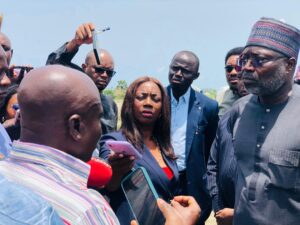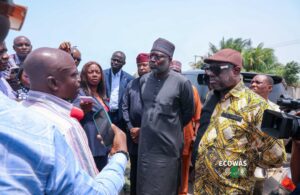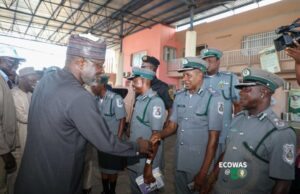When the Border Speaks, ECOWAS Listens: Dr. Touray Walks the Nigeria Lagos–Seme Corridor. By Raymond Enoch
It’s not every day that the head of a regional bloc steps beyond protocol and into the everyday struggles of the people he serves. But this week, Dr. Omar Alieu Touray, President of the ECOWAS Commission, did exactly that—trading conference halls for one of West Africa’s most contentious frontiers: the Nigeria–Seme border.
This was more than a visit. It was a statement.
No camera convoy. No ceremonial scripts. Just Touray, walking shoulder-to-shoulder with customs officers, border officials, traders, drivers, and commuters—listening to the noise beneath the noise.
For a region built on the promise of integration, the Lagos–Seme corridor ought to be a symbol of unity. Instead, it has become, in the words of one driver, “a toll gate of stress.”
The Weight of Everyday Struggle
The border throbbed with its usual energy—honking minibuses, shouting hawkers, and a crowd hardened by routine delays. But on this day, something changed: it was being seen.
Umar Danladi, a motorcycle operator, didn’t hold back:
“Every day—checkpoint after checkpoint. For what? First money, then more money. It’s draining.”
Tunde Musa, a cross-border textile trader, echoed the frustration:
“We follow the rules. We just want to do business. But there’s harassment, delays, and no one seems to care.”
David Adeoye, a daily driver between Lagos and Cotonou, added:
“The scanners haven’t worked in years. You queue for hours. It’s not integration—it’s intimidation.”
Yet amidst the discontent, there was a glimmer of hope. Wilifried Jousogne, a young man from the Benin Republic, shared a smoother recent experience—proof that when systems work, they make a difference.
A Leadership Moment Without a Podium
Dr. Touray didn’t perform; he engaged. He listened, asked pointed questions, and made space for unfiltered responses.
Inside the customs facility, he confronted a sobering reality: multi-million-naira scanners inactive since 2018. Pedestrian corridors without lighting. No water. No electricity. Border staff buying water in buckets and using flashlights to inspect cargo.
Flanked by Nigerian and Beninese officials, he posed a piercing question:
“If the ECOWAS Free Movement Protocol says we are one region, why are our citizens still treated like strangers on their own land?”
These were not diplomatic lines. They were the words of a leader gathering field notes—firsthand and unvarnished.
He wasn’t there to blame, but to shift the narrative: from delay to dignity, from policy to people.
Where Policy Meets Pavement.
As the visit progressed, structural cracks surfaced—duplicated checkpoints, blurred lines of authority, and a culture of bribery enabled by silence.
“It’s not just inefficiency,” Touray remarked. “It’s exhaustion. And it’s avoidable.”
Then came clarity:
“From this moment, every payment at this border must be receipted. If it’s official, let it be traceable. If not, it ends now.”
There was no applause—just the quiet recognition of change. Authority, applied with intention.
Still, Dr. Touray was clear-eyed.
“Free movement does not mean lawlessness. We need security, yes. But we also need professionalism, consistency, and basic respect. We owe our people that much.”
Nigeria -Lagos Seme as a Symbol
What unfolded at Seme Border was not an isolated inspection—it was a metaphor for the incomplete work of regional integration.
A protocol, no matter how visionary, is only as powerful as those who uphold it.
Dr. Touray’s message was unmistakable: the ECOWAS Free Movement Protocol is not just a policy—it’s a promise. When that promise is broken, it’s not a procedural lapse; it’s a betrayal of trust.
As he concluded his visit, his final words carried weight:
“This region belongs to its people. And if we are not fixing it for them, who are we fixing it for?”
A New Standard Takes Shape
Officials from Nigeria and Benin expressed gratitude for the visit. There was a shared realization: progress won’t come through declarations alone. It requires consistency, collaboration, and care of leaders and that is what Dr Omar Alieu Touray President ECOWAS Commission demonstrated.
Dr. Touray left without illusions. He knows the terrain—its bureaucracy, its fatigue. But for those who watched him walk the border—not above the people, but among them—something shifted. Not a photo opportunity but a precedent set by the visit.
As his convoy pulled away, a trader leaned toward a companion and said quietly:
“At least he came. That’s more than most do.”









